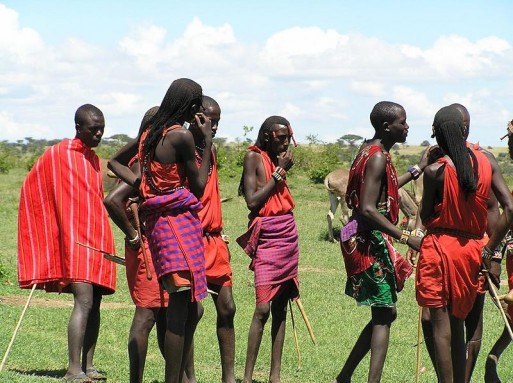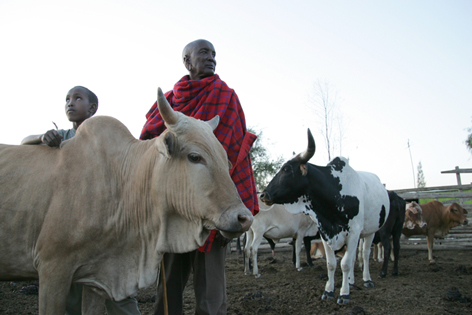
Credit: Wikipedia
For the Maasai people, death does not traditionally hold any secrets of the afterlife. Once an individual has passed, their journey has ended. All of their possessions and any of their sins are transferred to the loved ones who survive them. In this way, the memory of those who have been lost can be seen in what future generations can make of either the fortunes or the moral debts in the legacy that was left to them.
The Maasai themselves are a semi-nomadic ethnic group that live along the border of Kenya and Tanzania. They are a pastoral people who primarily value rearing cattle and raising children, and this is reflected in the patriarchal inheritance tradition that is known simply as ‘The Father’s Chest.’ This is a rite that must take place just before a father passes away, where all of the patriarch’s sons must return to him in his final days. This is to show respect for their father’s authoritative position in the family, and it is considered that not returning home during this time will place engooki—something akin to a curse or a sin—upon those who do not comply.
The memory of those who have been lost can be seen in what future generations can make of either the fortunes or the moral debts in the legacy that was left to them.
It is during this time that an inheritance is created for the children. Typically, at least one item of value is left to each son, and usually this accounts for a portion of the father’s remaining cattle. After these gifts are bequeathed, the remaining sons will come together again to bequeath a portion of their own cattle inheritance upon the firstborn son, again as a means of expelling any engooki that may come from increasing their own fortune at the expense of the eldest son. ‘The Father’s Chest’ itself refers to a Maasai proverb in which a son points out to his father that “you are like the chest that joins together two arms,” which alludes to a father’s central power in uniting his family.

Credit: Wikipedia
Because the Maasai do not believe in the afterlife, their burial practices are traditionally very minimalistic. They are most widely known for the practice colloquially identified by outsiders as the ‘Predator Burial,’ where the bodies of those who have passed are covered in ox blood or cattle fat and left in the bush to be eaten by predators. The smearing of blood and fat is meant to lure predators. Bodies that have not been picked at by predators on their second night in the bush are considered to be burdened with engooki that may latch on to the loved one’s surviving family. While the practice seems cruel, in fact, it is also generally considered a form of green burial, as the Maasai believe that burying their loved ones would be harmful to the environment and possibly bring pollution to surviving family members.
‘The Father’s Chest’ itself refers to a Maasai proverb in which a son points out to his father that “you are like the chest that joins together two arms,” which alludes to a father’s central power in uniting his family.
Traditionally, the Maasai are a monotheistic group that believes in the god Enkai or Engai, who is typically represented as either a black, benevolent god or a red, vengeful god. While this religion is still practiced to this day, most of the Maasai were converted to Christianity by missionaries in the early 19th century. As a result of this Christian influence, and due to mounting societal pressure from their neighbors, traditional burial is becoming more common. As a result of this, families that are brought together in recognition of ‘the Father’s Chest’ burial rite—who typically remain united in their father’s home until the patriarch’s body is fully decomposed and the bones have been separated—are now required to stay united for a longer period of time. What once could take only months may now take years—as the next generation adheres to the traditions of old and familial bonds are strengthened in new generations.
Related SevenPonds’ Articles:
- Bringing the Spirit Home in Xhosa Burial Rituals
- Swiss Pragmatism Extends into Death
- Green Burial Makes its Way to South Africa

 Traditional Inheritance and Burial Rites of the Maasai People
Traditional Inheritance and Burial Rites of the Maasai People


 “Hands Up to the Sky” by Michael Franti & Spearhead
“Hands Up to the Sky” by Michael Franti & Spearhead
 Coping With Election Grief
Coping With Election Grief
 Octogenarian Author Jane Seskin Offers a Model for Aging and Living Well
Octogenarian Author Jane Seskin Offers a Model for Aging and Living Well















Great work and an objective article it is.
Report this comment
Very useful resource
Report this comment
Really nice source to use!
Report this comment
THANK YOU FOR THIS BABES
Report this comment
im gay btw. hmu
Report this comment
this website is a great help
Report this comment